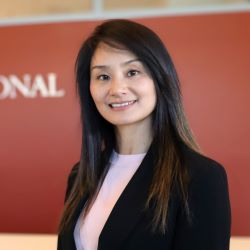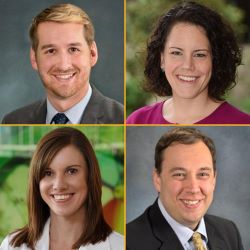Competitors Tackled Research Barriers at Translational Science Day
Friendly competition as a driver of innovation was a recurring theme of Translational Science Day on October 29. While UR CTSI’s flagship event focused on the benefits of translational science as a force to improve research and outcomes, two competitions were held to illustrate the field’s potential: the Three-Minute Thesis (3MT) and Translational Science Shark Tank events.
3MT
From left to right: Bei Liu, Salome Ghvinephadze, Shivali Vashisht, Nafisa Islam, Gayathri Guru Murthy, Muhammad Sadeqi Nezhad, Cyril Jabea Ekabe, Esteban Avendano-Fernandez.
The 3MT competition was held to highlight the work of Translational Biomedical Science program trainees. The students were challenged to distill their theses to three-minute pitches in an attempt to communicate their work as succinctly and accurately as possible. The competition was judged by Dongmei Li, PhD, Camille Martina, PhD, and Juile Thakar, PhD.
“The 3MT Translational Science competition helps students present translational aspects of their PhD projects, facilitating thinking to bridge the gaps between their research project and application in patient care,” Thakar said. "The Translational Biomedical Science students demonstrated their research communication and interdisciplinary skills during these presentations.”
Bei Liu, MD, MS, won the competition with her presentation on utilizing advanced microfluidic technology to synthesize carboxymethyl chitosan amorphous calcium phosphate nanoparticles. The nanoparticles enhance bone regeneration for the treatment of large bone defects, specifically in the context of orthopedic surgery. Liu is advised by Hani Awad, PhD, professor in the Department of Orthopaedics and the Center for Musculoskeletal Research.
“To condense a complex research project into a three-minute presentation, I focused on conveying the core problem, our innovative approach, and the potential impact of the work,” Liu said. She focused on only the key points and used accessible language to help a broader audience understand the significance of the research.
“It helped me refine my communication skills by challenging me to explain complex scientific concepts in a simple and engaging way,” Liu said. “This experience not only improved my public speaking skills, but also deepened my ability to connect with diverse audiences, which is essential for sharing research beyond the academic community.”
Salme Ghvinephadze and Esteban Avendano-Fernandez took second and third place, respectively.
Translational Science Shark Tank
Rounding out the day's programming was the Translational Science Shark Tank event, where teams were formed on the spot to develop solutions to seemingly intractable translational barriers. Given limited time, the teams quickly settled on problems to address and possible solutions to pitch. The competition was judged by Dina Uzri, PhD, MBA, Martin Zand, MD, PhD, Diane Morse, MD, and Janet Sowden.
“The Shark Tank event was a fantastic example of how translational science is indispensable to addressing barriers in research,” Zand said. “The competing teams developed excellent ideas in a very tight time frame, and effectively communicated solutions that would be relevant to many research areas.”
Shasha Cui, EdD, MBA, Reshma Ravilla, PharmD, MSRA, Catherine Sedota, MS, of the UB Clinical and Translational Science Institute, and Kari Steinmetz, assistant director of Clinical Research for the Department of Medicine, won the competition with their proposal of an “Open Research Round Table Committee.”
Because communications barriers between researchers and recruitment teams slow down the clinical research recruitment process, enrollment targets are often missed and the progress—and funding—of research initiatives is in jeopardy. The team’s solution was to institute a round table committee consisting of coordinators, principal investigators, and others involved in research studies.
“In our meetings, coordinators will sit in the inner ring while PIs occupy the outer ring, where they can listen and take notes, and afterward, the roles will switch,” Cui said. “A facilitator will guide the discussions. We can also apply this model to community engagement, allowing anyone to contribute ideas. Participants will collaboratively assess the pros and cons of each suggestion. It is essential to implement standardized protocols for these meetings to ensure efficiency and effectiveness.”
From left to right: Catherine Sedota, MS, Shasha Cui, EdD, MBA, Martin Zand, MD, PhD in shark costume, Reshma Ravilla, PharmD, MSRA, and Kari Steinmetz.
The group believes that more effective recruitment strategies will develop, enrollment targets can be met more often, research participants can by more fully engaged, and continued funding will be more secure.
“The study team, investigators, and the community will all benefit from the idea we proposed as the intent is to open communication between all parties and to facilitate breaking communication barriers in research,” Steinmetz said. “The competition was a great networking event bringing together clinical research professionals across the enterprise.”
Ravilla, who works for the Office of Regulatory Support, said the competition was invaluable for helping her gain insight into surrounding partner organizations.
“It’s a fantastic chance to connect with professionals from various fields,” Ravilla said. “The Shark Tank competition was an excellent platform to showcase research skills. Overall, it’s a wonderful opportunity to engage with some of the brightest minds in clinical research.”
Other Shark Tank competitors included Lok Ming (Tom) Tam, PhD, Esteban Avendaño-Fernández, Abigail Bossa, Sam Weisenthal, Colleen Burgoyne, Chloe Kraft, Chen Zhang, Jamison Seabury, Akm Rahman MD , DO, and Zeinab A. Mohamed.
Jonathan Raab | 11/13/2024



